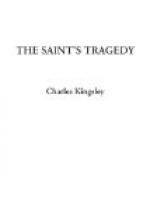See the rivers, how they run,
Changeless toward the changeless sea;
All around is forethought sure,
Fixed will and stern decree.
Can the sailor move the main?
Will the potter heed the clay?
Mortal! where the spirit drives,
Thither must the wheels obey.
Neither ask, nor fret, nor strive:
Where thy path is, thou shall go.
He who made the streams of time
Wafts thee down to weal or woe.
Eliz. That’s a sweet song, and yet it
does not chime
With my heart’s inner voice. Where had
you it, Guta?
Guta. From a nun who was a shepherdess in her youth—sadly plagued she was by a cruel stepmother, till she fled to a convent and found rest to her soul.
Fool. No doubt; nothing so pleasant as giving up one’s will in one’s own way. But she might have learnt all that without taking cold on the hill-tops.
Eliz. Where then, Fool?
Fool. At any market-cross where two or three rogues are together, who have neither grace to mend, nor courage to say ‘I did it.’ Now you shall see the shepherdess’ baby dressed in my cap and bells. [Sings.]
When I was a greenhorn and young,
And wanted to be and to do,
I puzzled my brains about choosing my line,
Till I found out the way that things go.
The same piece of clay makes a tile,
A pitcher, a taw, or a brick:
Dan Horace knew life; you may cut out a saint,
Or a bench, from the self-same stick.
The urchin who squalls in a gaol,
By circumstance turns out a rogue;
While the castle-bred brat is a senator born,
Or a saint, if religion’s in vogue.
We fall on our legs in this world,
Blind kittens, tossed in neck and heels:
’Tis Dame Circumstance licks Nature’s
cubs into shape,
She’s the mill-head, if we are the wheels.
Then why puzzle and fret, plot and dream?
He that’s wise will just follow his nose;
Contentedly fish, while he swims with the stream;
’Tis no business of his where it goes.
Eliz. Far too well sung for such a saucy song.
So go.
Fool. Ay, I’ll go. Whip the dog out of church, and then rate him for being no Christian. [Exit Fool.]
Eliz. Guta, there is sense in that knave’s
ribaldry:
We must not thus baptize our idleness,
And call it resignation: Which is love?
To do God’s will, or merely suffer it?
I do not love that contemplative life:
No! I must headlong into seas of toil,
Leap forth from self, and spend my soul on others.
Oh! contemplation palls upon the spirit,
Like the chill silence of an autumn sun:
While action, like the roaring south-west wind,
Sweeps laden with elixirs, with rich draughts
Quickening the wombed earth.
Guta. And yet what bliss,
When dying in the darkness of God’s light,
The soul can pierce these blinding webs of nature,
And float up to The Nothing, which is all things—
The ground of being, where self-forgetful silence
Is emptiness,—emptiness fulness,—fulness
God,—
Till we touch Him, and like a snow-flake, melt
Upon His light-sphere’s keen circumference!




